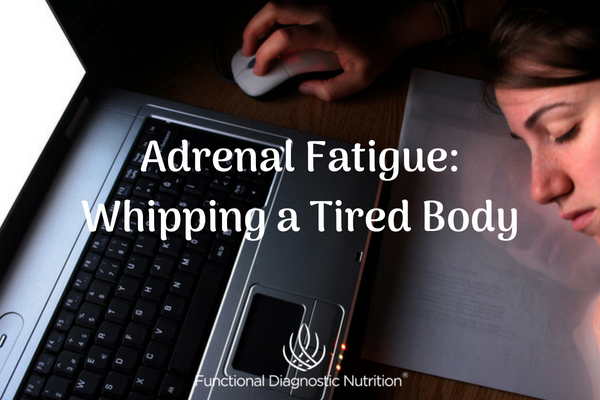Due to the fast paced and convenience driven lifestyle that has become so common, few of us are as healthy as we think.
In a world where nearly everyone is run down, it’s easy to accept as normal. But in reality, this is a compromised state of health that deprives you of a much better quality of life and can eventually lead to serious disease.
What is Adrenal Fatigue?
Although not formally recognized by conventional western medicine, adrenal fatigue is an extremely common condition in which the body is no longer able to handle the daily demands of our busy lives. The adrenal glands are at the center of our ability to handle the fast paced lifestyles that most of us live, and in many cases, these small glands can’t keep up with this level of demand long term. As with any other part of our body, with enough wear and tear, they begin to function with less capacity. It’s important to realize that adrenal fatigue is a condition that we nearly always impose upon ourselves through unhealthy lifestyle habits. Before we discuss adrenal fatigue in more detail, let’s consider how modern life predisposes us to it.
Modern Life is Fast Paced
While our ancestors didn’t have many of the luxuries and conveniences that we have today, it can easily be argued that they lived at a much more relaxed pace. In contrast to the many things we worry about today, their primary concerns were food and safety. This is how it was for millions of years and this is what our bodies have evolved to support. But within just the past century, we’ve completely reinvented the way we live. Although the technological advancements enjoyed by modern society provide us with tremendous opportunity, in many cases, they also make it easier for us to push ourselves well beyond our capacity. Many of us are under stress from the moment we wake up in the morning to the time we go to bed. It’s a tremendous burden for the body and many of us are paying a significant price without even realizing it.
Modern Living Promotes Unhealthy Habits
Technological advancement has also significantly changed how we eat and how we utilize our free time. While our ancestors had no choice but to eat natural whole foods, we currently eat a diet that is highly processed, lacks quality nutrients, and contains chemical toxins. And without artificial light sources like the light bulb, our ancestors typically slept whenever it was dark and got plenty of sleep. Today, we stay up well into the late hours of the night, sometimes even into the next morning, and get far less sleep than we need. Balancing the physical and mental demands of your lifestyle with adequate support for recovery is an essential aspect of good health. The burden of modern living increases the need for excellent nutrition and additional rest, but instead of supporting this need, many of us do the complete opposite by eating poorly and resting less.
The Importance of the Adrenal Glands
The adrenal glands are two walnut sized glands that rest on top of the kidneys. Although small, they play a significant role in our health and vitality. They support our ability to handle stress, keep us alert and energized throughout the day, regulate our blood sugar, and reduce inflammation. In short, it’s our adrenal glands that allow us to push ourselves to the limit all day. But because these small glands are not evolved to handle this type of demand on a consistent basis, they wear out. This is the essence of adrenal fatigue, and once it happens, hormones become imbalanced, bone and muscle integrity becomes compromised, thyroid function is inhibited, brain and nervous system function becomes impaired, digestion is compromised, and immunity weakens. This compromised state of health causes unpleasant symptoms and increases susceptibility to disease.
Lifestyle and Adrenal Fatigue
As already mentioned, adrenal fatigue is often a condition that we impose upon ourselves. Because the adrenal glands are involved in so many vital functions, a wide variety of unhealthy habits can overwhelm them. The following are the most significant aspects of lifestyle that you should consider closely in your attempts to avoid or recover from adrenal fatigue.
Stress
Whether exciting or aggravating, mental or physical, any type of stimulating activity is a form of stress that stimulates the adrenal glands. This is the “fight or flight” response that has kept us safe from danger for millions of years. However, very few of the modern day activities that stimulate this response come with the level of danger that our body perceives them to. With the extreme amount of stimulating activity that many of us pack into each day, our adrenal glands are being pushed to capacity for nearly the entire time that we’re awake. To avoid this, it’s essential that you learn how to moderate your stress.
Nutrition
Many modern foods are high in sugar and refined carbohydrates, and often cause rapid and dramatic increases in blood sugar. Because this is extremely dangerous, the body responds with urgency to push the level of blood sugar back down, often to the extent of lowering it too much. When this happens, it’s the adrenal glands that are mostly responsible for bringing blood sugar back up to normal levels. Many people cause this fluctuation on a regular basis by frequently eating foods that are high in sugar or refined carbohydrates, and as a result, put a significant burden on the adrenal glands. The Metabolic Typing Diet is an excellent way to support your health by not only eating well, but also by regulating your blood sugar. Food sensitivities are another common and significant dietary issue because of the intestinal inflammation that they cause. The body’s primary anti inflammatory hormone is produced by the adrenal glands, and once again, they’re forced into action. Food sensitivities are often difficult to identify, and as a result, it’s common for people to cause inflammation on a regular basis by frequently eating foods that they’re sensitive to. As with a high sugar diet, this repetition is a tremendous burden on the adrenal glands.
Sleep
As I already mentioned, our ancestors didn’t have the artificial sources of light that presently allow us to continue our daily activities late into the night. While it’s our adrenal glands that allow us to do this, they simply aren’t evolved to support it on a regular basis. As such, frequently staying up late gives the adrenal glands an additional job that they aren’t meant to handle. It also infringes upon the rest that’s needed for the adrenals to recover from all the other demands put on them. Because our bodies are evolved to operate in harmony with the rhythm of day and night, it’s best to be in bed as close to sunset as possible. A practical and reasonable compromise that works for most people is 10 PM, but some people need more sleep than others, and based on schedule limitations, will need to be in bed earlier. It’s also a good idea to develop good sleep habits that will help you fall asleep more easily each night.
A Sad State of Normalcy
Many people engage in all of the unhealthy habits described above on a daily basis and are consistently causing their adrenal glands to work serious overtime. It’s no wonder why so many people are run down and why this has become the normal standard of health. A large majority of the population is suffering from poor health and living a compromised life without even realizing it.
Whipping a Tired Horse
There’s a pivotal point in the development of adrenal fatigue where people push themselves from bad to worse. Unfortunately, most people fail to recognize the initial symptoms of adrenal fatigue as a sign of compromised health. Instead, they chase their symptoms in pursuit of temporary relief, and in the process, compromise their health even further. Despite low energy being one of the most common symptoms of adrenal fatigue, it rarely provokes people to slow down and get the rest they severely need. Instead, they push through their fatigue and even pat themselves on the back for their perseverance. As you now know, this puts additional burden on the already sluggish adrenal glands and just makes matters worse. When perseverance isn’t enough, most people begin relying on the stimulus provided by exercise, sugar, or caffeine to get them through the day. Each of these methods literally force your tired adrenal glands to function beyond their capacity, and this is exactly like whipping a tired horse. The only difference is that you’re the horse! Each cup of the precious morning coffee that you depend on might as well be a slash on the back! What to Do As with most other health problems, you must follow a well rounded healthy lifestyle to avoid or recover from adrenal fatigue. Even if you’re following an excellent diet, you still won’t achieve good health if you’re neglecting your high levels of stress or lack of sleep. To get started with a healthier lifestyle, I recommend you familiarize yourself with the concept of optimal health, and also the 7 foundational factors of achieving it. Although a healthier lifestyle can make a significant difference in anyone’s life, some people will find that it just isn’t enough to fully recover from adrenal fatigue. In these cases, testing is needed to assess the stage of adrenal fatigue, supplements are needed to support the recovery of the adrenal glands, and bio-identical hormone supplementation is necessary to regain proper balance. If this sounds like something you are in need of, contact me for additional information.
Further Reading
If you’d like to learn more about the science behind adrenal fatigue and the common lifestyle factors that cause it, an excellent resource is Adrenal Fatigue: The 21st Century Stress Syndrome by Dr. James L. Wilson.
Photo credit: freeimages.com/Gozde Otman







